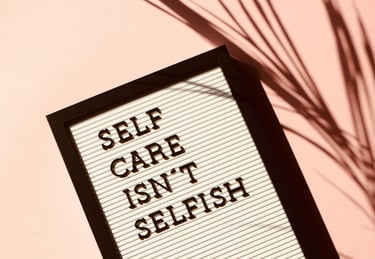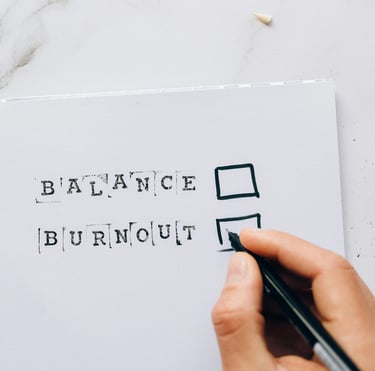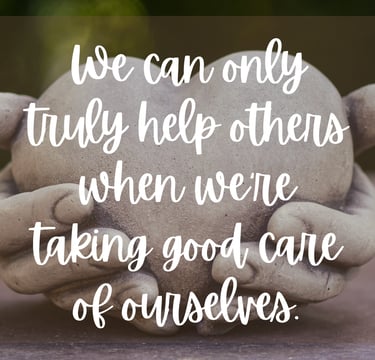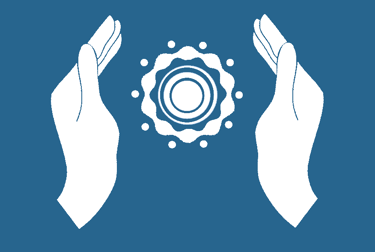
Be Selfish
Why being selfish is good for you.
THEME OF THE WEEK
The theme of this past week seems to have been around being selfish. It started with a conversation with a friend who had been in an argument and was accused of being selfish. It was a comment that really hurt her, as she had always been taught as a child that it is wrong to be selfish. So, naturally, throughout her life that is the one thing she could not abide by. What followed was a discussion around how selfish she actually was and what it means to be selfish.
Selfishness is something I started to question in my twenties. I had grown up in Guiding where the Brownie Guide motto then was “Think of others before yourself and do a good turn every day”. It was something I took to heart and I often put the needs of others before my own. At its extreme, there were situations where I would be asked to make a choice and I would dither because I was so concerned with making the right choice that would please everyone. As much as I knew I wasn’t a selfish person, it still took me another 20 years to break this habitual way of thinking. So this conversation got me to review again where I am at with it. First, let’s look at the definition of selfish.
Selfish:
Chiefly concerned with one’s own interest, advantage etc, especially to the exclusion of the interests of others.
Relating to or characterised by self-interest.
The first definition is behaviour that goes after what the individual needs, without a care for how it impacts others, to ensure more pleasurable experiences for themselves or to be at an advantage. This behaviour can be deemed “Self-Centred” or “Self-Absorbed” , meaning to be totally preoccupied with one’s own concerns
Defining Selfish
The second definition relates to self-interest. When we behave or make choices that are for our own good. This is vital for our self- care and is essential for maintaining mental, emotional, and physical well-being.


When we review our apparent selfish behaviour by these definitions, it is likely we were self-interested rather than self-absorbed. The accuser however, if hurt by this behaviour, would view it as self-absorbed. What they are saying is that you have put your own needs before theirs, without a care for how it might make them feel.
When we are taught not to be selfish, what we are actually taught is that it is not good to be self-absorbed or self-centred. I think though that we have taken it to also mean that self-interest is bad. Is it ? If we avoid being self-interested we would never make any decisions that were in our best interests. We would be doing everything someone else wanted, even if it is not right for us.
Is it bad?


The other issue is that none of us want to feel bad or have others view us as bad people. When we are taught selfishness is bad, we will aim to avoid it, so that we do not feel bad. It leads us to judge how our own actions could be considered selfish.
Enter the Selfish Judge. That little voice that keeps us in check. This internal judge voice is formed from our beliefs about what it means to be selfish. As soon as we then behave in any way that may be perceived selfish, it tells us we are bad and makes us feel guilty. The more we pass this judgement, the more we behave in ways that puts the needs of others before our own. We can become self-sacrificing and begin to give to others more than we receive. We forget that we are not responsible for the feelings, wants and needs of others. If this was the basis of the "how not to be selfish lesson", I think on reflection we would respond with, I don't think so!


We also need to recognise the emotional aspect of this. When we become overly attentive to the wants and needs of others, we may start trying to manage situations, believing that we can act in ways that protect their feelings. At times, our empathy can go too far, and in understanding someone else’s struggles, we might absorb their emotions and feel responsible for them. This can lead us to behave in ways we think are best for the other person. As a consequence, we may unintentionally take away their autonomy and limit their chances to learn and grow.
What I find most fascinating about this discussion is that it highlights how our beliefs influence our behaviour and how those beliefs can sometimes become outdated and need re-evaluating. It also illustrates how distorted beliefs can affect the way we manage our energy. When we consistently prioritise the needs of others above our own, we draw too heavily from our personal energy reserves. Over time, this can cause us to neglect our own goals, desires, and needs, including those related to our health and wellbeing. As a result, we may start to feel resentful, depleted, lacking in direction, or constantly in need of rest. Sometimes, when we do rest, we then feel guilty for being lazy and thinking of ourselves first.
Give and Take - The Energy of Selfishness


In the practice of Reiki, the principle of energy exchange is foundational for maintaining balance and harmony. Energy must be received to replenish what has been given. It can be thought of as a reservoir; if you continuously draw water from it without allowing it to refill, you risk depletion. This exchange does not always manifest as a direct return of energy from the recipient back to the giver. Instead, it can be seen in various forms such as gratitude, acknowledgment, or acts of kindness paid forward.




In relationships, we all make judgments about the balance of giving and receiving. We might ask ourselves: What am I getting out of this? Is it worth the effort?
These evaluations are often subjective and can change depending on the situation. There are, of course, times when others’ needs must take precedence, such as when parenting or caring for someone who cannot care for themselves.
By paying attention to our own needs and staying aware of our thoughts and feelings in these moments, we can begin to identify what feels right and what doesn’t. The more we understand what drains us or makes us uncomfortable, the clearer our personal priorities become. We also discover our boundaries, which protect both our short and long-term wellbeing.
This idea also applies to how we help and support others. Before stepping in, it can help to ask ourselves: If I step in to help, what will it cost me? We might think about how it could affect our time, money, or physical and emotional energy. After all, we can only truly help others when we’re taking good care of ourselves. If we’re not feeling our best, the support we give won’t be as effective.
How do we strike a balance between being self-absorbed, self-interested, practising self-care, and being a supportive friend?
Through this awareness, we can also begin to recognise what lies within our capabilities and what does not. Accepting these limits allows us to feel more comfortable with asking for help and, importantly, with receiving it.
Selfish can refer to being self-absorbed and/or self-interested
Being self-interested is ok. It is a form of self-care.
Self-care is not selfish because it is essential for maintaining our mental, emotional, and physical well-being.
We can only truly help others when we’re taking good care of ourselves.
We can aim for balance by:
reviewing what our belief is about being selfish and self-care.
learning our priorities and our wants and don’t wants, helping to understand our boundaries and accept our limitations - leading us to seek help when needed.
learning to say no! – making ourselves a priority - know it is ok to say no without feeling guilty, especially if we are putting our self-care first.
being honest about what our needs are - this opens up the opportunity for discussion and negotiation.
Summary
Reiki can support you throughout this process, creating a sense of balance that allows you to explore your beliefs, behaviours, and relationships. Through this clarity, you can gain a deeper understanding of your priorities and restore harmony across all areas of your life.


